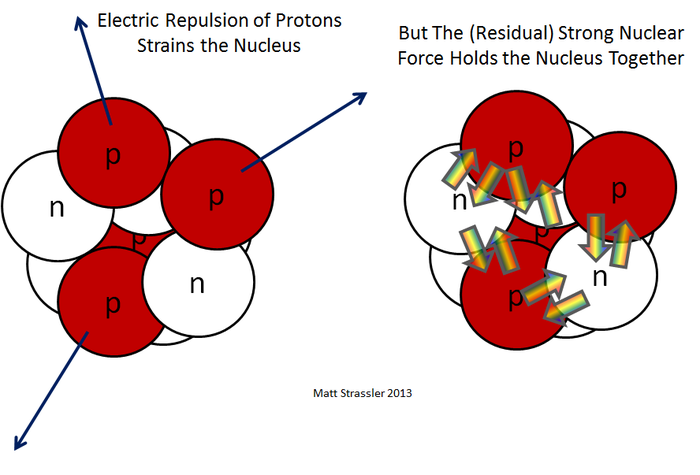The strong nuclear force, one of the four fundamental interactions in nature, plays a critical role in the stability and existence of matter as we know it. Encompassed within the framework of quantum chromodynamics, this formidable force is responsible for binding protons and neutrons in the nucleus of an atom. However, the question arises: is it possible to turn off the strong nuclear force on Earth? This inquiry provokes a multitude of philosophical and scientific musings, as well as broad implications for our understanding of the universe.
To address this query, it is essential first to comprehend the nature of the strong nuclear force. This force operates over extremely short ranges, typically on the order of femtometers (10-15 meters), and is significantly stronger than both the electromagnetic force and the weak nuclear force. It is mediated by particles known as gluons, which interact with quarks to form protons and neutrons. The stability provided by this binding force is what allows atomic nuclei to exist, creating the building blocks of all matter. Without the strong nuclear force, atoms could not maintain integrity, leading to a fundamental restructuring of the universe.
Proceeding to the prospect of disabling this force, we must navigate through theoretical and practical considerations. Scientific literature on the subject explores various aspects of particle physics and quantum mechanics. In essence, “turning off” the strong nuclear force would imply altering the fundamental laws that govern atomic interactions. Current understanding posits that the strong force is an intrinsic property of the universe, essentially woven into the fabric of matter through the standard model of particle physics.
Considering the implications of manipulating such a robust force, one must delve into the notion of symmetry in fundamental interactions, particularly electromagnetic gauge symmetry and its relation to the strong force. While there are modifications of existing theories that could potentially render the strong force ineffective, such modifications typically require conditions not found naturally on Earth, such as extremely high energy levels analogous to those found in the early universe or during high-energy particle collisions (for example, in the Large Hadron Collider).
Theoretical physicists have explored scenarios involving symmetry breaking, wherein certain forces may become dominant under specific conditions. Such scenarios suggest possibilities in which the strong nuclear force may weaken or temporarily become ineffective. However, these conditions are far from practical application on Earth. The prevailing sentiment in contemporary physics is that we currently lack the technology and the understanding necessary to manipulate the strong nuclear force.
Furthermore, the ramifications of disabling the strong nuclear force would be catastrophic. If such a scenario were feasible, the immediate consequence would be the disintegration of atomic nuclei. For perspective, consider that the nuclei of hydrogen, helium, carbon, and all other elements would unravel into a cloud of free protons and neutrons. This disarray would ultimately obliterate the stability of matter as we know it. Stars would extinguish, planets would cease to exist, and life, as we understand it, would be nonexistent.
A deeper, more philosophical question emerges from this inquiry: why do we find the strong nuclear force—its application and its potential manipulation—so fascinating? The concept of controlling fundamental forces touches upon humanity’s innate desire for dominion over nature. The juxtaposition of such immense power against our fragile existence prompts reflections on ethics in scientific advancement. It challenges the very essence of our understanding of reality and evokes a sense of awe at the complexities underlying the cosmos.
As scientists continue to explore the realms of nuclear physics and quantum mechanics, the quest to understand forces such as the strong nuclear force remains paramount. Research into high-energy particle collisions and theoretical frameworks extending beyond the standard model, such as string theory or loop quantum gravity, may one day yield new insights into the nature of fundamental forces. Although the notion of ‘turning off’ the strong nuclear force on Earth remains firmly in the realm of theoretical speculation, it underscores our ongoing journey toward enlightenment on the underlying principles that govern our universe.
In conclusion, the strong nuclear force forms the bedrock of matter and the universe as we know it. Any notion of disabling this force unfurls a myriad of scientific, philosophical, and ethical conversations. While the idea may kindle the imagination and evoke a profound sense of intrigue, our current scientific framework does not support the feasibility of such undertakings. As we traverse the ever-expanding landscape of knowledge, we are reminded of our humble place in the cosmos, borne from the very forces we seek to comprehend.












